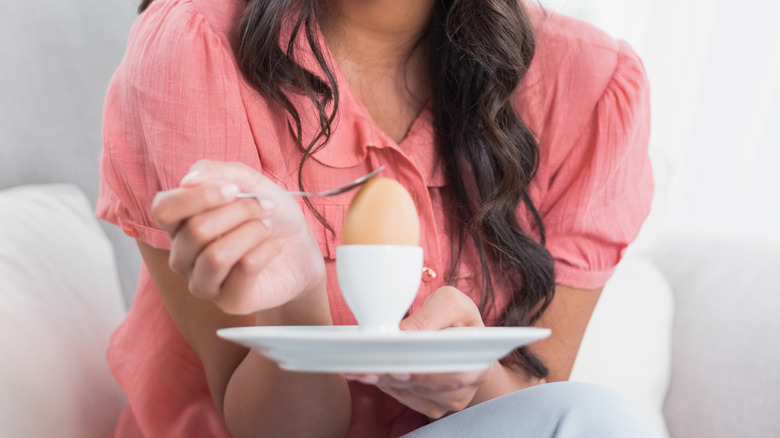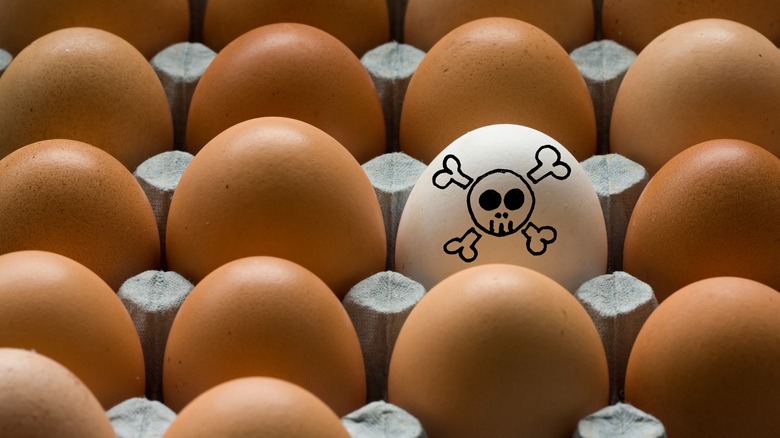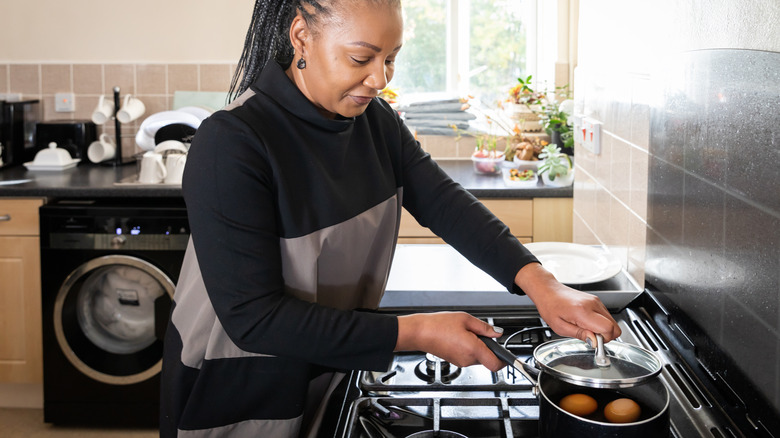Is It Safe To Eat A Hard-Boiled Egg With A Green Yolk?
Eggs are a great way to get protein and fat-soluble vitamins during breakfast, lunch, or dinner. A single egg is just 84 calories, which means having a hard-boiled egg as a snack won't add too much to your waistline. Eggs also have betaine and choline for your heart health and brain health, and lutein and zeaxanthin can support healthy eyes (via BBC Good Food).
Eggs can also carry dangerous bacteria if they aren't handled and cooked properly. Salmonella can cause fever, abdominal cramps, and diarrhea if your eggs aren't cooked to at least 160 degrees (via the Food and Drug Administration). Yet even if you fully cook a hard-boiled egg, sometimes the egg yolk might have a green ring around it. According to the U.S. Department of Agriculture, a green ring around a hard-boiled egg's yolk is due to sulfur and iron reacting on the egg's surface when the egg's been cooked too long. You might also find a green ring around the yolk if your cooking water has a lot of iron. It might look unsightly to eat a green yolk, but it's perfectly safe.
Other things to watch for in your eggs
The USDA says eggs might also take on a greenish color if they've been sitting on a steamer for too long or cooked at too high of a temperature. Your egg is also safe if you notice blood spots in the yolk or a cloudy egg white. You might also find a variety of colors of egg yolks depending on what the hen has eaten. A diet with orange pigments in the plants could mean a darker yellow yolk. However, you'll want to look out for a pink or iridescent egg white, because that indicates the presence of Pseudomonas bacteria.
Even though older eggs are easier to peel, they're also more likely to get a green ring around the yolk, according to the Egg Farmers of Canada. Older egg whites become more alkaline, so they're more susceptible to the sulfur and iron reaction.
To ensure your eggs are safe, the FDA says to make sure they're refrigerated when you buy them at the store. Inspect the eggs for any cracks or dirt. Once you get home, store them in their original carton in a 40-degree temperature refrigerator. Any USDA-graded eggs are already sanitized, so you don't need to wash them when you get home, according to the USDA. Besides, washing them could mean that any bacteria from your wash water could get into the shell.
Cooking and storing your hard-boiled eggs
Hard-boiled eggs can make a quick snack or you can keep them on hand for salads or sandwiches, according to the Egg Farmers of Canada. To make perfect hard-boiled eggs, arrange the eggs in a single layer in a large pot. Fill the pot with enough water so that you have about an inch of water covering the eggs. Cover the pot and turn the heat to high. When the water comes to a boil, immediately remove the pot from the stove and set your timer for 10 to 12 minutes. Smaller eggs will take less time, while larger eggs will need a little more time. After the timer goes off, drain the hot water from the pot and rinse cold water over the hard-cooked eggs. This will stop the eggs from cooking and prevent that green ring around the yolk.
To open a hard-cooked egg, crack the egg slightly on a hard surface. To loosen the shell, roll it on a hard surface. Because there's an air pocket at the large end of the egg, start peeling the shell from that end.
Hard-boiled eggs won't last as long in your refrigerator as uncooked eggs because the protective coating on the shell has been washed off, says the USDA. Without this protective coating, bacteria are more likely to enter the exposed pores of the shell. Hard-cooked eggs can be safely stored in the refrigerator for a week, but they cannot be frozen.



